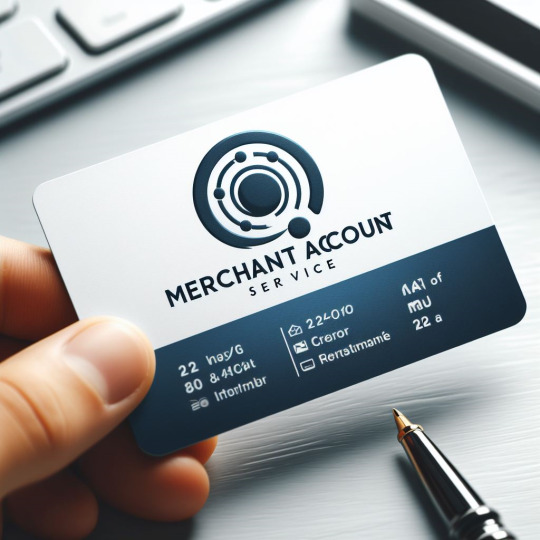#merchant account providers
Text

1 note
·
View note
Text
Internet merchant accounts for High risk Business?
Internet merchant accounts for High risk Business?
Internet merchant accounts are essential for "high-risk businesses" to conduct online transactions smoothly and efficiently. As the world continues to embrace digitalization, it is becoming increasingly important for businesses to establish an online presence and cater to the needs of their customers. However, certain industries are deemed high-risk due to various factors such as chargeback rates, fraud potential, or legal and regulatory concerns. To navigate these challenges and ensure a "secure payment process", high-risk businesses must obtain "internet merchant accounts" that provide the necessary tools and protection.
High-risk businesses encompass a wide range of industries, including online pharmacies, adult entertainment platforms, and online gambling websites. These industries are considered high-risk due to the potential for fraudulent activities, strict legal and regulatory oversight, or customers disputing charges and demanding chargebacks. Thus, "acquiring an internet merchant account" specifically designed for high-risk businesses is crucial for their survival and growth.

An internet "merchant account for high-risk businesses" offers several advantages. Firstly, it provides businesses with a secure payment gateway that enables credit card transactions and protects sensitive customer information. Given the nature of high-risk businesses, security measures must be in place to prevent unauthorized access, data breaches, and fraudulent activities. Consequently, an internet merchant account with robust security features promotes trust between the business and its customers, increasing customer satisfaction and loyalty.
Another significant benefit of internet "merchant accounts for high-risk businesses" is the ability to manage chargebacks effectively. Chargebacks occur when customers dispute transactions and request a refund directly from their issuing banks. High-risk businesses often experience a higher rate of chargebacks due to factors such as dissatisfied customers, fraud, or illegal activities. Therefore, an effective chargeback management system provided by an internet "merchant Bank account" allows businesses to resolve and mitigate chargeback disputes efficiently, minimizing financial losses and maintaining a positive reputation.
Furthermore, internet merchant accounts cater specifically to the unique needs and legal compliance requirements of "high-risk businesses". Each industry has its regulations and restrictions that necessitate careful attention and adherence. For instance, pharmaceutical businesses must comply with strict FDA guidelines, while online gambling platforms must follow local and international gambling laws. By partnering with a "merchant account provider specializing in high-risk businesses", these organizations can ensure compliance and avoid penalties, legal issues, and potential shutdowns.
In conclusion, "high-risk businesses require internet merchant accounts" to facilitate secure and efficient online transactions. These accounts provide crucial benefits such as secure payment gateways, effective chargeback management systems, and compliance with industry-specific regulations. By obtaining an internet merchant account designed for high-risk businesses, organizations can navigate the challenges associated with their industries, protect their customers' sensitive information, and ensure a smooth payment process. Embracing the digital era and establishing a strong online presence are crucial for high-risk businesses to remain competitive and thrive in today's market.
Offshore Gateways merchant accounts |
Merchant accounts |
Merchant accounts online |
Internet merchant accounts |
Set up merchant accounts |
Merchant account fees in USA |
Merchant account fees in UK |
Open merchant account online |
Merchant accounts credit card |
Merchant Bank Account |
Merchant account providers |
High risk merchant account instant approval |
High Risk merchant account in USA |
High Risk merchant account in UK |
High Risk payment Gateway |
Forex merchant account |
Gambling Merchant Account |
Best merchant account services |
Online casino merchant account providers |
#Offshore Gateways merchant accounts#Merchant accounts#Merchant accounts online#Internet merchant accounts#Set up merchant accounts#Merchant account fees in USA#Merchant account fees in UK#Open merchant account online#Merchant accounts credit card#Merchant Bank Account#Merchant account providers#High risk merchant account instant approval#High Risk merchant account in USA#High Risk merchant account in UK#High Risk payment Gateway#Forex merchant account#Gambling Merchant Account#Best merchant account services#Online casino merchant account providers#offhsoregateways
0 notes
Text
How much does it cost to open a merchant account?

(Human directed ai content.)
Opening a merchant account is a crucial step for businesses looking to accept credit and debit card payments. Whether you operate a brick-and-mortar store or an online business, having the ability to process card payments can significantly expand your customer base and streamline transactions. However, the cost of opening and maintaining a merchant account can vary depending on several factors. In this article, we'll explore the typical expenses associated with setting up a merchant account and factors that influence these costs.
Initial Setup Fees:
One of the primary costs associated with opening a merchant account is the initial setup fee. This fee covers the administrative costs of establishing the account and can range from zero to several hundred dollars. Some merchant account providers may offer promotions or waive setup fees for new customers, so it's essential to shop around and compare offers before committing to a provider.
Monthly Service Fees:
In addition to the setup fee, most merchant account providers charge a monthly service fee to maintain the account. This fee covers ongoing support, account maintenance, and access to payment processing services. Monthly service fees can vary widely depending on the provider and the level of service you require. Basic accounts may have lower monthly fees, while accounts with additional features or higher transaction volumes may incur higher fees.
Transaction Fees:
Every time a customer makes a purchase using a credit or debit card, a transaction fee is charged. This fee typically consists of a flat rate plus a percentage of the transaction amount. The exact transaction fee can vary depending on factors such as the type of card used (credit or debit), the card network (Visa, Mastercard, etc.), and the volume of transactions processed each month. It's essential to understand the transaction fee structure offered by your merchant account provider and how it will impact your overall costs.
Discount Rates:
In addition to transaction fees, merchants are also charged a discount rate on each transaction. The discount rate is a percentage of the transaction amount that is deducted by the merchant account provider as a processing fee. This fee is typically higher for credit card transactions than for debit card transactions, reflecting the higher risk and processing costs associated with credit cards. Like transaction fees, discount rates can vary depending on factors such as card type, card network, and transaction volume.
Additional Fees:
In addition to the fees mentioned above, merchants may also encounter other charges, such as:
Chargeback fees: Charged when a customer disputes a transaction and the funds are reversed.
PCI compliance fees: Charged to ensure compliance with Payment Card Industry Data Security Standards.
Equipment costs: If you require hardware such as card readers or point-of-sale terminals, there may be additional costs associated with purchasing or leasing this equipment.
Factors Influencing Costs:
Several factors can influence the cost of opening and maintaining a merchant account, including:
Business type: Certain industries, such as high-risk businesses or those with a history of chargebacks, may face higher fees and stricter requirements.
Processing volume: Higher transaction volumes may qualify you for lower fees or preferential rates with some providers.
Contract terms: Long-term contracts may offer lower rates but can also lock you into a provider with limited flexibility.
Provider reputation: Established providers with a track record of reliability and excellent customer service may charge higher fees than newer or less reputable providers.
Conclusion:
The cost of opening a merchant account can vary significantly depending on your business needs, transaction volume, and the provider you choose. While there are several fees to consider, including setup fees, monthly service fees, transaction fees, discount rates, and additional charges, it's essential to evaluate these costs in the context of the value and convenience that accepting card payments can bring to your business. By comparing offers from multiple providers and negotiating terms where possible, you can minimize costs and find a merchant account solution that meets your needs without breaking the bank.
#merchant account#merchant account pricing#merchant account fees#merchant account rates#how to get a merchant account#merchant account providers#what is a merchant account#merchant account processing#how to open a merchant account#merchant services#merchant account application#how does a merchant account work#how to open merchant account without ssn#how to set up a merchant account#how to create a merchant account#are you able to open merchant account with itin
1 note
·
View note
Text
A Guide to High-Risk Payment Processing and the Best Merchant Account Providers

In the dynamic landscape of e-commerce, businesses often find themselves categorized as high-risk merchants due to various factors such as the nature of their products or services, chargeback rates, or regulatory concerns. High-risk payment processing is a specialized niche in the payment industry that caters to businesses facing higher levels of risk. In this guide, we will delve into the intricacies of high-risk payment processing and explore the best merchant account provider to help businesses navigate this challenging terrain.
Understanding High-Risk Payment Processing:
High-risk payment processing refers to the specialized services provided to businesses deemed riskier by traditional financial institutions. Industries such as online gaming, adult entertainment, and nutraceuticals often fall into this category due to the increased likelihood of chargebacks, regulatory scrutiny, or volatile market conditions. To mitigate these risks, businesses require tailored payment solutions and specialized merchant account providers.
Challenges Faced by High-Risk Merchants:
High-risk merchants encounter unique challenges that necessitate specialized payment processing solutions. Exorbitant chargeback rates, regulatory uncertainties, and the potential for fraud make it difficult for these businesses to secure traditional merchant accounts. Many mainstream payment processors are hesitant to onboard high-risk merchants, leaving them in search of reliable alternatives.
The Importance of Merchant Account Providers for High-Risk Businesses:
Merchant account providers play a crucial role in facilitating payment processing for high-risk businesses. These providers understand the intricacies of high-risk industries and offer tailored solutions to address the specific challenges faced by such merchants. From chargeback management to fraud prevention, the best merchant account providers for high-risk businesses are equipped with the expertise and technology needed to ensure smooth and secure transactions.
Top Merchant Account Providers for High-Risk Businesses:
PayPal:
PayPal is a well-known payment processor that also caters to high-risk merchants. With its vast network and advanced fraud detection tools, PayPal provides a reliable solution for businesses operating in high-risk industries.
Stripe:
Stripe is another popular choice for high-risk payment processing. Known for its flexibility and ease of integration, Stripe offers a range of tools and features that make it suitable for businesses facing elevated risk levels.
Radiant Pay:
Radiant Pay has been a stalwart in the payment processing industry, serving high-risk merchants with robust solutions. Its comprehensive suite of services includes secure payment gateways, and customizable reporting.
Skrill:
Skrill specializes in catering to high-risk industries, offering a secure and efficient payment platform. With a global presence and a focus on risk management, Skrill is a preferred choice for businesses in need of high-risk payment processing.
Instabill:
Instabill is a merchant account provider that specifically targets high-risk businesses. It provides customized solutions, including multi-currency support and offshore merchant accounts, to meet the unique needs of high-risk merchants.
Conclusion:
Navigating the complexities of high-risk payment processing requires a strategic approach and the right merchant account provider. Businesses operating in high-risk industries must prioritize finding a reliable payment processing partner that understands their unique challenges. By choosing from the best merchant account providers in the market, high-risk merchants can secure a robust payment infrastructure that enables growth while effectively managing risk. As the e-commerce landscape continues to evolve, having a trusted partner for high-risk payment processing becomes increasingly vital for the success of businesses in these challenging industries.
0 notes
Text

#Echeck#Electronic Check#Merchant Services#Payment Processing#Merchant Account#Payment Processing Companies#Payment gateway providers#Best Merchant Services#High Risk Merchant Account#Echeck Account#Echeck Payment Processor#Echeck Payment#Echeck Payment Processing#Electronic Check Payment#what is an echeck#Check 21#echeck casino#e commerce payment processing
3 notes
·
View notes
Text

seems like it can't be closed 😭
#office life#worklife balance#happylife#meme#funny#funny meme#tuesday meme#office memes#paymentgateway#merchant account provider#merchantaccount
4 notes
·
View notes
Text
Merchant account services are a set of financial services that facilitate businesses to accept credit, debit cards and other types of electronic payments. Click here to apply for merchant account.
#Merchant account#merchant account provider#open merchant account#merchant account for small business
2 notes
·
View notes
Text
Top 7 Reasons Why Forex Traders Merchant Accounts Fail And Lose Money in high Risk Industry
Forex trading is a high-risk industry that can be lucrative but also comes with its challenges. One critical aspect of running a successful forex trading business is having a reliable merchant account that allows for seamless payment processing. However, many forex traders face difficulties with their merchant accounts, leading to financial losses and business failures. Let's explore the top 7 reasons why forex trader merchant account fail and lose money.
Lack of Understanding of High-Risk Nature
One common reason for merchant account failures among forex traders is a lack of understanding of the high-risk nature of the industry. Forex trading is considered high-risk due to factors like market volatility, regulatory complexities, and potential for chargebacks. Without a thorough understanding of these risks, traders may struggle to find suitable merchant account providers willing to work with them, leading to account closures and financial losses.
Poor Credit History or Financial Standing
Merchant account providers assess the credit history and financial standing of applicants to determine their risk level. Forex traders with poor credit scores or unstable financial backgrounds may face challenges in obtaining merchant accounts or may be subject to unfavorable terms such as high processing fees or rolling reserves. This can significantly impact their profitability and lead to financial losses in the long run.
Lack of Compliance with Regulations
Forex trading is a heavily regulated industry, with strict compliance requirements to prevent fraud, money laundering, and other financial crimes. Traders who fail to adhere to these regulations risk having their merchant accounts suspended or terminated, leading to disruptions in payment processing and potential financial losses. It is crucial for forex traders to stay updated on regulatory requirements and ensure full compliance to maintain their merchant accounts.
High Chargeback Ratios
High chargeback ratios are a red flag for merchant account providers as they indicate potential risks and financial liabilities. Forex traders may experience high chargeback ratios due to factors like disputes over trading outcomes, unauthorized transactions, or dissatisfied customers. Excessive chargebacks can lead to account closures, financial penalties, and reputational damage, ultimately resulting in financial losses for traders.
Inadequate Risk Management Practices
Effective risk management is essential for forex traders to protect their merchant accounts and financial assets. Traders who fail to implement robust risk management practices may be exposed to market volatility, fraud, or operational errors that can lead to financial losses. By implementing risk mitigation strategies, such as setting stop-loss orders, diversifying portfolios, and monitoring trading activities closely, traders can safeguard their merchant accounts and minimize financial risks.
Lack of Transparent Business Practices
Transparency is key in the forex trading industry, especially when it comes to financial transactions and customer interactions. Traders who engage in opaque or misleading business practices may raise suspicions among merchant account providers, leading to account closures or financial penalties. Maintaining clear and transparent communication with customers, disclosing all relevant information, and adhering to ethical standards can help traders build trust with their merchant account providers and avoid financial losses.
Choosing the Wrong Merchant Account Provider
Selecting the right merchant account provider is crucial for the success of forex traders. Choosing a provider that lacks experience in handling high-risk industries like forex trading or imposes restrictive terms and conditions can hinder traders' ability to process payments efficiently and cost-effectively. It is essential for traders to research and compare different merchant account providers, considering factors like reputation, pricing, customer support, and industry expertise to avoid financial losses and ensure smooth payment processing operations.
Conclusion:
In conclusion, forex traders face various challenges when it comes to maintaining successful merchant accounts and avoiding financial losses. By understanding the high-risk nature of the industry, maintaining compliance with regulations, implementing effective risk management practices, and choosing the right merchant account provider, traders can mitigate risks and enhance their profitability in the competitive forex trading landscape. By addressing these key factors, forex traders can improve their chances of success and minimize the likelihood of online forex trading merchant account failures and financial losses.
#forex trader merchant account#online forex trading merchant account#merchant account#merchant account provider
0 notes
Text
Understanding The Key Elements That Make a Business High-Risk
When it comes to operating a business, one of the critical aspects that entrepreneurs need to consider is the risk associated with their industry. Certain businesses are classified as high-risk due to various factors that make them more prone to financial instability, legal issues, or other challenges. Understanding what makes a business high-risk is essential for entrepreneurs looking to navigate this landscape successfully. In this article, we will delve into the key elements contributing to a business being classified as high-risk and explore the importance of securing the best high-risk merchant account to manage payment processing effectively.

What Makes a Business High-Risk?
Industry Type: Certain industries inherently carry more risk than others. Businesses operating in sectors such as adult entertainment, gambling, pharmaceuticals, and travel are often classified as high-risk due to regulatory scrutiny, chargeback potential, or other factors specific to the industry.
High Chargeback Rates: A high volume of chargebacks can signal potential issues with customer satisfaction, service quality, or product reliability. Businesses with excessive chargebacks are often deemed high-risk as they pose a financial risk to payment processors.
Poor Credit History: For businesses with a history of financial instability, bankruptcy, or late payments, obtaining traditional merchant accounts can be challenging. Such businesses are considered high-risk due to the increased likelihood of payment defaults.
Reputation and Compliance Concerns: Businesses with a tarnished reputation, legal issues, or compliance violations are often labeled high-risk. Maintaining a clean record and adhering to industry regulations are crucial for mitigating risk.
International Operations: Companies that operate globally or deal with international customers face additional risks such as currency fluctuations, cross-border regulations, and fraud. These factors contribute to the high-risk classification.
Importance of a High-Risk Merchant Account
Specialized Services: High-risk merchant accounts are tailored to meet the unique needs of businesses operating in risky industries. These accounts offer specialized services such as chargeback management, fraud protection, and risk mitigation strategies.
Risk Management: By partnering with a provider offering the best high-risk merchant account, businesses can access tools and resources to effectively manage risk. These accounts often have robust security measures and monitoring systems to prevent fraud and chargebacks.
Payment Processing Solutions: High-risk merchant accounts provide businesses with reliable payment processing solutions that cater to their specific industry requirements. These accounts support a wide range of payment methods, currencies, and transaction types to facilitate seamless transactions.
Regulatory Compliance: High-risk merchant account providers are well-versed in industry regulations and compliance standards. By working with a reputable provider, businesses can ensure that they meet all legal requirements and avoid potential penalties or fines.
Business Growth: Securing a high-risk merchant account enables businesses to expand their operations, reach a broader customer base, and increase revenue. These accounts offer scalability and flexibility to support growth and adapt to changing market dynamics.
Conclusion:
In conclusion, understanding the key elements that make a business high-risk is crucial for entrepreneurs seeking to navigate the complexities of the business landscape effectively. By recognizing the factors that contribute to this classification and securing the high-risk merchant account, businesses can mitigate risks, optimize payment processing, and drive sustainable growth in their respective industries.
#best high risk merchant account#high risk merchant account#high risk merchant accounts#high risk merchant account providers
0 notes
Text
The Gateway to International Trade: Offshore Merchant Accounts and Instant Approval
Are you looking to expand your business into international markets? Are you seeking a seamless and efficient way to process payments from customers worldwide? Look no further! Paycly’s gateway to international trade awaits you with offshore merchant accounts and instant approval. As an expert content writer, Paycly unlocks a world of opportunities for your business. These accounts are specifically designed to handle international transactions, making them indispensable for companies with a global customer base.
Understanding Offshore Merchant Accounts
Offshore merchant accounts are specialized financial accounts that allow businesses to accept payments in various currencies, particularly those outside their home country. They offer the flexibility needed to navigate the complexities of international trade, providing a platform for seamless cross-border transactions. With the combination of instant approval, businesses don’t need to waste any more time waiting, and they can focus on other business strategies.
Exploring the Need for Instant Approval
In the fast-paced world of international trade, time is of the essence. Delays in obtaining merchant account approval can hinder a business's ability to swiftly engage with international customers and partners. This is where the need for Paycly’s offshore merchant account instant approval solutions becomes evident. Businesses require efficient mechanisms that streamline the process of acquiring these accounts, ensuring they can swiftly capitalize on global opportunities.
The Benefits of Instant Approval for Offshore Merchant Accounts
Speed and Efficiency: With instant approval, businesses can swiftly access their offshore accounts, enabling them to kickstart international transactions without unnecessary delays.
Seamless Global Reach: Instant approval paves the way for businesses to seamlessly reach customers across borders, fostering a broader international customer base.
Currency Flexibility: By securing offshore merchant account instant approval, businesses can transact in multiple currencies, catering to the diverse needs of global clientele.
Enhanced Competitiveness: Quick access to offshore accounts bolsters a company's competitive edge in the global marketplace, allowing it to respond promptly to market demands.
Reduced Opportunity Costs: Instant approval mitigates the risk of missed business opportunities, ensuring that companies can promptly capitalize on international trade prospects.
Overcoming Regulatory Hurdles: Compliance and Instant Approval
Navigating regulatory requirements is a critical aspect of obtaining offshore accounts. Instant approval solutions are designed to address compliance challenges effectively, ensuring businesses meet the necessary regulatory standards while expediting the approval process. By aligning with regulatory frameworks, offshore merchant account instant approval gives businesses the confidence to engage in international trade while maintaining adherence to legal and financial regulations.
The Future Landscape: Technology and Instant Approval for Offshore Merchant Accounts
As technology continues to advance, the future landscape of offshore accounts, especially those provided by Paycly, is poised for innovation. Enhanced automation, robust security measures, and streamlined verification processes are anticipated to further expedite the approval of offshore accounts. Paycly's commitment to leveraging cutting-edge technology will play a pivotal role in simplifying the onboarding process for businesses seeking to establish offshore accounts, fueling greater efficiency in international trade transactions.
In conclusion, Paycly's offshore merchant account with instant approval serve as the gateway to international trade, empowering businesses to navigate global transactions with ease and agility. As companies strive to expand their reach across borders, the seamless accessibility of these accounts through Paycly's instant approval solutions is instrumental in realizing their international trade ambitions. By embracing the benefits of instant approval and leveraging technological advancements, businesses can embark on a journey of global growth and success, transcending boundaries to connect with a world of opportunities.
In the ever-evolving landscape of international trade, the synergy between Paycly's offshore merchant accounts and instant approval continues to redefine the possibilities for businesses, propelling them towards a future of boundless global commerce.
Visit us at: High risk merchant instant approval
Originally published on: Medium’Article
#High risk merchant account instant approval#High risk merchant account#offshore merchant account#payment processing for high risk#Credit card processing for high risk#International credit card processing#Offshore merchant services#Forex merchant account#High risk merchant service providers#credit card processing for high risk#high risk merchant services#high risk merchant account instant approval#offshore merchant processing#best high risk merchant account#gambling merchant account
0 notes
Text
#Echeck#Electronic Check#Merchant Services#Payment Processing#Merchant Account#Payment Processing Companies#Payment gateway providers#Best Merchant Services#High Risk Merchant Account#Echeck Account
1 note
·
View note
Text

What is a Merchant Account and do I need one?
A "merchant account" and its functions is accurate. It's indeed a crucial financial tool that enables businesses to accept electronic payments from customers using debit and credit cards. This system streamlines the payment process and enhances convenience for both businesses and customers. The points you've mentioned about the flow of funds, the holding period, and the associated fees provide a comprehensive overview of how merchant accounts operate.
Merchant accounts offer several benefits to businesses:
Payment Flexibility: By accepting debit and credit cards, businesses can accommodate a broader range of customer payment preferences.
Convenience: Customers appreciate the convenience of paying with cards, reducing the need for carrying cash.
Professionalism: Accepting card payments can enhance a business's reputation and professionalism, which can be particularly important for online or retail businesses.
Increased Sales: Offering multiple payment options, including card payments, can lead to increased sales as customers are more likely to make purchases when their preferred payment methods are available.
Reduced Risk: Handling fewer cash transactions can help reduce the risk of theft or loss.
Online Transactions: Merchant accounts are essential for businesses conducting online transactions, as they allow seamless integration with e-commerce platforms and payment gateways.
Financial Insights: Some merchant service providers offer tools and reports that provide valuable insights into sales trends and customer behavior.
Fraud Protection: Payment processors often include security features and fraud detection mechanisms to protect both the business and its customers.
Global Transactions: Businesses can accept payments from customers around the world, opening up opportunities for international sales.
It's important for businesses to choose their merchant service provider carefully. Comparing fee structures, contract terms, customer support, and available features can help businesses make an informed decision that aligns with their needs. As technology and payment systems continue to evolve, merchant accounts remain a crucial component of modern commerce.
#Offshore Gateways merchant accounts |
#Merchant accounts |
#Merchant accounts online |
#Internet merchant accounts |
#Set up merchant accounts |
#Merchant account center |
#Merchant account fees |
#Merchant accounts credit card |
#Merchant bank account |
#Merchant accounts for small businesses |
#Merchant account providers |
#Open merchant account online |
#merchant account providers#cryptocurrency#open merchant account online#merchant accounts#merchant accounts online#internet merchant accounts#set up merchant accounts#merchant account center#merchant account fees#merchant accounts credit card#merchant bank account#Merchant accounts for small businesses
0 notes
Text
Do You Need Good Credit for a Merchant Account?

(Human directed ai content.)
In today's digital age, having a merchant account is crucial for businesses of all sizes. Whether you're a small startup or an established corporation, accepting credit and debit card payments is often essential for maximizing sales and providing convenience to customers. However, one common concern among business owners is whether good credit is necessary to obtain a merchant account. Let's delve into this topic to understand the role of creditworthiness in acquiring a merchant account.
Firstly, it's essential to grasp the concept of a merchant account. A merchant account is a type of bank account that allows businesses to accept payments via debit or credit cards. When a customer makes a card payment, the funds are transferred from the customer's account to the merchant account. From there, the funds are typically deposited into the business's regular bank account within a few days, minus any fees charged by the payment processor.
Now, onto the question of creditworthiness. While it's true that some payment processors may conduct credit checks as part of their application process, having perfect credit isn't always a prerequisite for obtaining a merchant account. Many factors come into play when payment processors assess an applicant's eligibility, and credit history is just one of them.
Payment processors may consider various factors when evaluating a merchant account application, including:
Business Type and Industry: The nature of your business and the industry you operate in can influence the risk assessment process. Some industries are considered higher risk than others, such as travel, adult entertainment, or e-commerce.
Processing History: If your business has a history of processing payments, especially with the same payment processor, it can positively impact your application. A track record of successful transactions demonstrates reliability and reduces perceived risk.
Business Financials: Payment processors may review your business's financial statements, including revenue, cash flow, and profitability. A healthy financial position can enhance your chances of approval, even if your personal credit isn't stellar.
Chargeback History: A high volume of chargebacks can raise concerns for payment processors, as it suggests potential issues with customer satisfaction or service quality. Minimizing chargebacks is essential for maintaining a positive relationship with payment processors.
Compliance and Legal Factors: Adherence to industry regulations, such as PCI DSS (Payment Card Industry Data Security Standard), is crucial for securing a merchant account. Compliance with anti-money laundering (AML) and Know Your Customer (KYC) requirements is also essential.
While credit checks are a standard part of the application process for some merchant account providers, there are alternative options available for businesses with less-than-perfect credit. For instance, high-risk merchant account providers specialize in serving businesses with higher perceived risk due to factors like poor credit, industry type, or processing history. These providers often offer tailored solutions and may be more lenient in their credit assessment criteria.
Additionally, some payment processors offer "instant approval" or simplified application processes that may not involve extensive credit checks. However, these options may come with higher fees or more stringent terms to offset the perceived risk.
Ultimately, while good credit can certainly improve your chances of obtaining a merchant account and may lead to more favorable terms, it's not always a deal-breaker. Businesses with less-than-perfect credit can still explore options for accepting card payments and finding a payment processor that meets their needs.
In conclusion, while good credit may be beneficial when applying for a merchant account, it's not necessarily a requirement. Payment processors consider various factors beyond credit history when assessing an applicant's eligibility, including business type, processing history, financials, and compliance measures. Businesses with less-than-perfect credit can explore alternative options, such as high-risk merchant account providers, to secure the payment processing solutions they need to thrive in today's competitive market.
#merchant account#merchant account fees#merchant account rates#merchant services#what is a merchant account#merchant account pricing#high risk merchant account#merchant account providers#credit card processing#merchant accounts#high risk merchant account fees#merchant account processing#high risk merchant account approval#merchant account for high risk business#what is a high risk merchant account#high risk merchant accounts
1 note
·
View note
Text
Radiant Pay UK offers High Risk Payment Processing Services, providing secure and efficient solutions for businesses facing high-risk transactions. With advanced technology and expertise, Radiant Pay ensures reliable payment processing, enabling businesses to manage high-risk payments seamlessly and confidently.
#high risk payment processing#merchant account providers#merchant account solution#payment processing solutions in uk
0 notes
Text
https://www.wetranxact.co.uk/key-considerations-for-selecting-a-high-risk-merchant-account-provider/
Key Considerations for Selecting a High-Risk Merchant Account Provider
All businesses, especially those operating in high-risk industries, need to choose a high-risk merchant account provider that is right for them. It could be a crucial factor in their success, which is why businesses in adult entertainment, e-commerce, and online gambling can’t survive without them. But what if you’re new to the term? What exactly is a high-risk merchant account? Let’s look at its definition.
0 notes